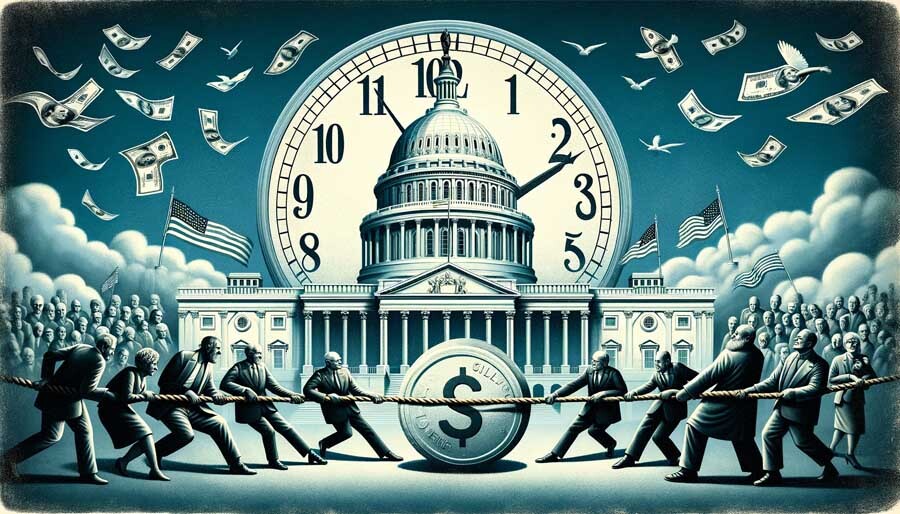
Posted by - News Staff![]() \
\
January 8, 2024 \
Filed in - Politics \
GOP Dems $1.6 trillion federal budget for 2024 \
3.2K views \ 0 reviews
DLNews JTFMax:
In a decisive move, Congressional leaders have agreed on a $1.6 trillion federal budget for 2024, marking a critical juncture in government spending negotiations. This bipartisan decision, announced on Sunday, sets the stage for potentially averting a looming government shutdown, though not without its share of controversy and challenges.
The deal, a product of intense negotiations, has sparked criticism from conservative factions, underscoring the ongoing tensions within the Republican Party. House Speaker Mike Johnson (R., La.) acknowledges the agreement as a compromise, highlighting "hard-fought concessions" from Democrats, including canceling unspent pandemic aid. However, this budget level exceeds the limits some conservatives had hoped for, revealing internal party rifts.
Key battles remain unresolved, with the possibility of increased friction between Johnson and his conservative bloc, especially given the Republicans' slim majority. The House Freedom Caucus, known for its ultra-conservative stance, has openly expressed dissatisfaction, labeling the agreement a "total failure."
The $1.6 trillion figure, a slight increase from the initial $1.59 trillion proposed during debt-ceiling talks with President Biden, reflects a middle ground between the House's push for austerity and the Senate's inclination towards increased funding. This agreement is essential for moving forward with the annual spending bills, which have been stalled, necessitating short-term extensions.
Defense spending is slated to receive $886 billion, with nondefense spending figures varying between the House's $704 billion and the Senate's $773 billion estimate. This discrepancy partly arises from differing approaches to certain deal aspects, including veterans' programs.
A notable aspect of the deal includes a $20 billion reduction in funds for the Internal Revenue Service, a rollback from the $80 billion boost received in Biden's Inflation Reduction Act. This cut aligns with a previous understanding between Biden and then-Speaker Kevin McCarthy, highlighting ongoing fiscal policy debates.
However, the agreement isn't just about cuts. It also minimizes using a budgetary tactic that involves canceling unused mandatory spending to boost discretionary budgets. Such maneuvers have been a point of contention among spending hawks.
The path to this agreement was complex, with House and Senate negotiators initially diverging after setting the preliminary budget cap. The House proposed significant spending cuts, while the Senate leaned towards increased allocations, adding emergency funds and additional nondefense spending.
With the Jan. 19 deadline approaching, Congress is pressured to finalize all 12 spending bills when funding for several agencies expires. A failure to do so could trigger a government shutdown, halting paychecks for federal workers and military personnel and pausing nonessential functions.
Challenges still need to be addressed in reconciling differing bills from the House and Senate, especially with contentious provisions in several bills, ranging from abortion-related policies to cuts in farm programs. The narrow time window adds to the urgency of aligning these versions to prevent a shutdown or deep spending cuts under the spring debt deal terms.
In conclusion, while the agreement on the $1.6 trillion budget marks a significant step towards maintaining government operations and funding priorities, it also highlights the intricate balance of power and the need for continued bipartisan cooperation amidst internal party disagreements and looming deadlines.

Desert Local News is an invitation-only, members-based publication built on fact-checked, non-biased journalism.
All articles are publicly visible and free to read, but participation is reserved for members—comments and discussion require an invitation to join.
We cover local, state, and world news with clarity and context, free from political agendas, outrage, or misinformation.
Comments